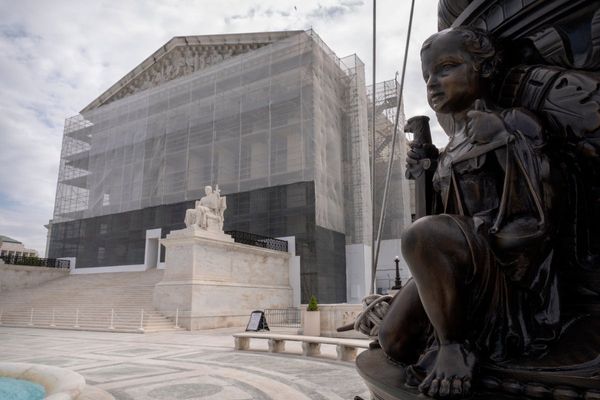
Zambian-born Welsh director Rungano Nyoni has delivered a pulsingly odd and strikingly original debut: a tale of dogma, prejudice and corruption in the country of her birth. It’s a strange witches brew of deadpan farce and arthouse stillness that some will find exasperating, and it’s not without its missteps; but there’s a confidence and clarity of vision that’s hard not to admire, especially for a first feature.
Events open with Shula (Maggie Mulubwa), a shy and inexpressive orphan, being accused by her fellow townspeople of witchcraft: one woman has alleged that she made her trip over while carrying a bucket of water, and a man has backed up her allegation with his own account of the girl chopping of his arm with an axe. (Said arm has miraculously reattached itself by the time he makes this claim.) A gloriously droll police officer indulges these accusations with a mix of apathy and outright disdain, but the will of the people is clear, and Shula is exiled from the town.
Shula falls into the care – though that word is used with a degree of caution – of Mr Banda (Henry BJ Phiri), a venal and desperately inept public official who spies an opportunity to make a fortune from the girl’s supposed gifts. She’s swiftly enrolled into a witch camp, a shabby conurbation on the edge of town whose occupants are, Shula aside, exclusively elderly women. Shula has a white ribbon attached to her back – the other end is attached to a large spool – and is told that if she cuts it she will become a goat. The presence of the ribbon naturally brings to mind Michael Haneke’s The White Ribbon, and there are certainly the same themes of puritanism as seen in that film, albeit expressed in a far less austere manner.
Soon Shula is being put to work, picking criminals from lineups, appearing on talk shows in full witchy get-up, and attempting to summon rain to the dried-up region. Shula does all of this grudgingly, far more sceptical of these superstitious beliefs than the adults around her – although it is notable that the general belief in witchcraft seems to be conditional, and tends to be expressed more vociferously when there’s a benefit to doing so. Many of the witches, for example, are elderly relatives who family members were keen to dispose of, and a tourist industry has built up around the camp.

There’s a seam of straight-faced satire running through I Am Not a Witch that curiously brings to mind the naturalistic farce of The Thick of It. Phiri is excellent as the officious Banda, a snake oil salesman frequently upended by his own incompetence, reminiscent of Chabuddy G in People Just Do Nothing or David Brent at his most brazen. Yet Nyoni never lets the comedy overwhelm our outrage at the treatment of Shula, especially when events take a troubling turn towards the film’s conclusion.
For all its charms, there is a languidness to Nyoni’s film that can become aggravating. Scenes that should pass by in moments outstay their welcome, and the film sometimes prioritises aesthetics over clear storytelling, with one of the film’s most crucial moments rendered difficult to understand due to a tricksy camera shot.
Still, there’s more than enough here to mark out Nyoni, whose film has been supported by Cannes’ Cinefondation Residency, as a major talent. In the staid and Eurocentric world of arthouse cinema, she looks set to be a significant new broom.







